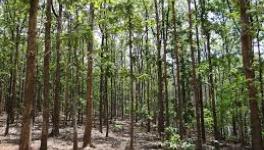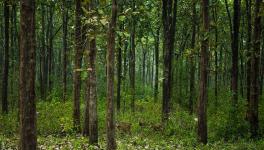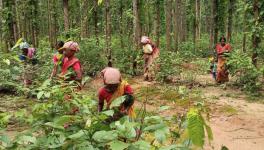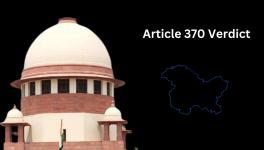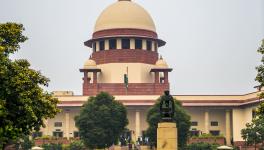Forest Rights Act: While Non-BJP States Perform Better, Law is Moving at a Snail’s Pace in J&K
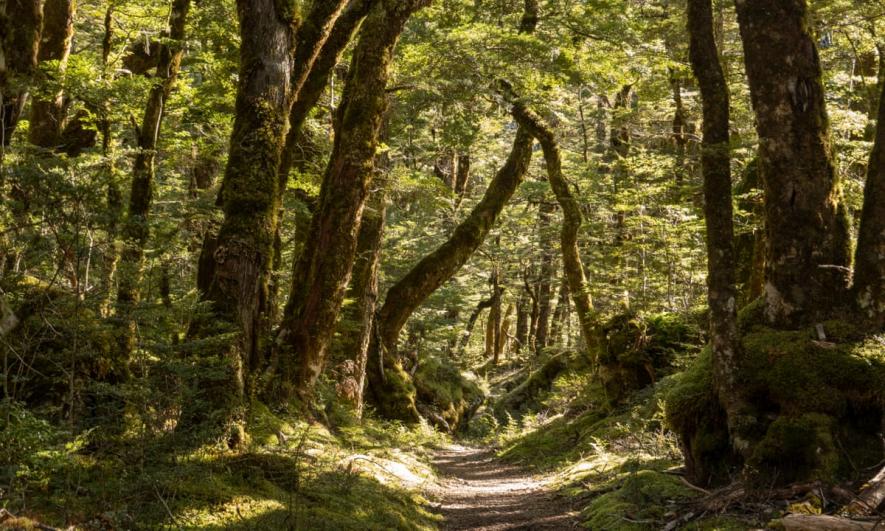
Image credit: The Leaflet
It is now almost 15 years since the Scheduled Tribes and Other Traditional Forest Dwellers (Recognition of Forest Rights) Act, 2006, more commonly known as the Forest Rights Act of 2006 (FRA), has been in operation.
However, a majority of the Scheduled Tribe (ST) and Other Traditional Forest Dwellers (OTFDs) living in and around forests of the country are yet to get the entitlements under this historic legislation.
According to the preamble of the FRA, the law has been enacted to recognise and vest the forest rights in favour of the forest-dwelling Scheduled Tribes (FDSTs) and OTFDs who have been residing in such forests for generations but whose rights could not be recorded.
The preamble further reads:
“To provide for a framework for recording the forest rights so vested and the nature of evidence required for such recognition and vesting in respect of forest land.
“Whereas the recognised rights of the forest dwelling Scheduled Tribes and other traditional forest dwellers include the responsibilities and authority for sustainable use, conservation of biodiversity and maintenance of ecological balance and thereby strengthening the conservation regime of the forests while ensuring livelihood and food security of the forest dwellings Scheduled Tribes and other traditional forest dwellers..”
The Parliament has accepted the fact that forest rights on ancestral lands and their habitat were not adequately recognised in the consolidation of state forests during the colonial period as well as in independent India resulting in historical injustice to the FDSTs and OTFDs. The words “historical injustice” have been incorporated in the preamble of the FRA.
Rajya Sabha Q&A
On December 15, a Member of Parliament (Rajya Sabha) from Odisha, Dr Sasmit Patra, who is also a senior leader of the Biju Janata Dal (BJD) sought details from the Government about implementation of the FRA at a national level. The MP sought the following details from the Ministry of Tribal Affairs (MoTA):
“Will the Minister of Tribal Affairs be pleased to state: the details of total land pattas/rights provided under Forest Rights Act, 2006 to the forest dwellers in the country over the past three years?”
The Parliament accepted that forest rights on ancestral lands were not adequately recognised in India, while enacting the FRA.
Dr Patra sought state-wise and year-wise details of the previous three years. While responding to this question, the Minister of State for Tribal Affairs, Government of India, Bishweshwar Tudu, provided comprehensive information. The data reveals that implementation of the FRA is happening at a snail’s pace as the majority of the states have provided entitlements under this act to a handful of families and communities.
The FRA received assent from the President on December 29, 2006, and various studies have shown that not even 10 per cent of the intended beneficiaries have received their benefits, under this legislation, across the country. The law recognises the rights of the STs & OTFDs, vis a vis forest resources, on which these communities are dependent, including livelihood, habitation, and other socio-cultural needs. The forest management policies, including those under legislation during British India and post-colonial India, did not, till the enactment of the FRA, recognise the symbiotic relationship of the STs and OTFDs with the forests.
Under the FRA, there are two main rights given to individual families and communities. Under the Individual Forest Rights (IFR), there is a provision for right to cultivation and habitation on the forest land. Under the Community Forest Rights (CFR), the communities have grazing rights, fishing rights and access to water bodies in forests, habitat rights for Particularly Vulnerable Tribal Groups (PVTGs) and access to traditional seasonal resources for pastoral and nomadic communities.
Under CFR, there is recognition of traditional customary rights and the right to protect, regenerate, conserve or manage any community forest resource for sustainable use. The CFR also provides the right to allocate forest land for developmental purposes like construction of school buildings, health centers, community halls or even allocating forest land for village graveyards or setting up a cremation ground.
Bihar, UP and Uttarakhand are the worst performers
Out of a list of 20 states provided by the MoTA, the state of Odisha has distributed around 4,50,335 titles under the FRA. Out of this, around 4,43,686 people received the Individual Forest Rights (IFR) and 6649 Community Forest Rights (CFR) claims were received by various communities.
Bihar, UP, Uttarakhand, Himachal Pradesh, Tamil Nadu are the worst performing states when it comes to the implementation of the FRA. Bihar has given a mere 121 IFR titles to its people with effect from March 31, 2019 to August 31, 2021.
In Uttar Pradesh, a mere 18,910 individuals have been given entitlements under the FRA. Ironically, only 861 CFR claims have been decided between March 2019 to August 2021 across 75 districts of UP. In Uttarakhand, only 157 IFR claims were finalised from March 31, 2019 to August 31, 2021.
In Himachal Pradesh, the state Government has decided only 164 IFR claims and 65 CFR claims, respectively, from March 31, 2019 to August 31, 2021. In Tamil Nadu, only 8144 individual families have benefited under the FRA in the last three and a half years. In addition to the same, not more than 450 CFR claims have been decided.
Non-BJP states were better performers
As per the data provided by the MoTA, the non-BJP ruled states were performing better with regard to the implementation of the FRA.
After Odisha, Chhattisgarh ranked number two in FRA implementation. The Congress-led Bhupesh Baghel Government in Chhattisgarh has decided around 4,23,218 IFR claims and 21,967 CFR claims between March 31, 2019 to August 31, 2021. During the same time, 4,43,686 individuals have been provided rights under the FRA in Odisha and 21,967 CFR claims were also decided.
Maharashtra has decided 1,72116 IFR claims and 7084 CFR claims respectively. Pertinently, Maharashtra is ahead of Odisha in giving the CFR titles.
Bihar, UP, Uttarakhand, HP, TN are the worst-performing states in implementation of the FRA.
While talking to The Leaflet, Ramlal Kale, a noted FRA activist from Payvihir Melghat district, Amravati, Maharashtra, said:
“The Vidarbha region of Maharashtra particularly Amravati district is considered to be a model district with regard to FRA implementation. We have taken a lead in distribution of Community Forest Rights (CFR) claims and this was only possible because of the work done by some community-based organizations (CBOs) like Khoj, Vidarbha Nature Conservation Society (VNCS). These organizations had already been fighting for the landless people living in forests around Vidarbha region. The landless people had been using the forest land for agriculture purposes much before the enactment of FRA and after this law was passed these NGOs played a pivotal role in its awareness and advocacy and that helped many communities getting entitlements under CFR.”
Around 182 hectares of forest land have been allotted under CFR to the local communities in Payvihir and adjoining villages in 2012. The land allotment had been a great success as local panchayats have earned huge revenue in the last 10 years from various forest produce. This has helped the local villagers, as well.
Madhya Pradesh is credited with providing the highest number of CFR titles under the FRA. From March 31, 2019 to August 31, 2021, around 27,976 CFR claims have been decided that have helped a huge number of forest-dwelling communities.
Although the state Government is more focused on forest dwelling scheduled tribes (FDSTs), other traditional forest dwellers (OTFDs) are also now being given entitlements under the FRA. Odisha is taking a great lead in this. In Nayagarh district, dozens of non-tribal communities have been given CFR titles under the FRA in the last few months.
As per the information provided to the Rajya Sabha by the MoTA, all the 27,976 community claims in Madhya Pradesh that have been decided and entitlements given to forest-dwelling communities between March 31, 2019 to March 31, 2020, were given by the previous Government which lasted for only fifteen months. The Congress-led Kamal Nath Government which was in power from December 17, 2018 to March 23, 2020, in order to woo the tribal vote bank, decided such a huge number of community claims.
Between March 31, 2020, to August 31, 2021, the BJP-led Government in MP has only decided seven to eight CFR claims. With regard to IFR claims, the Kamal Nath Government gave 2,26,313 titles to different individuals and less than 4000 individuals have been given FRA entitlements under the current Shivraj Singh Chauhan’s Government.
Tripura is the only BJP-ruled state that is relatively performing better vis a vis the implementation of the FRA. The BJP-led Biplab Kumar Deb Government there has decided 1,27,986 IFR claims. In addition to it, 55 CFR titles have also been allotted to the forest dwelling communities.
West Bengal is also not a good performer. The Mamata Banerjee Government has given titles under the FRA to 45,130 individuals and 686 community claims were also decided between March 31, 2019, to August 31, 2021. When we compare West Bengal with Tripura, it is evident that Tripura is the better performer as the state is also smaller in area, compared to West Bengal.
In Gujarat, only 95,363 individuals have gotten the rights under the FRA in the last 15 years. Around 3887 CFR claims have also been decided between March 31, 2019, to August 31, 2021.
The FRA was extended to Jammu & Kashmir post the abrogation of Article 370 of the Constitution. Instead of rolling out the law with immediate effect, as per the J&K Reorganisation Act of 2019, it took the Government more than a year to introduce this act on the ground level. The information provided by the MoTA to Dr. Sasmit Patra has no mention of J&K.
As per the official information obtained by this author under the Right to Information Act, 2005 (RTI Act), from districts of Udhampur and Budgam, only 10 community claims (5 each in both districts) have been decided by the respective District Level Committees (DLCs) headed by the District Collectors. In addition to this, only two individual claims have been decided in Budgam district. Information from 18 other districts has not been provided even after two months.
Taking serious notice of the very slow implementation of the FRA, the Chairperson of the District Development Council, Budgam, Nazir Ahmad Khan wrote an official letter to the Lt Governor Manoj Sinha recently.
The DDC Chairman (Zilla Parishad Chief) expressed his concern about the slow pace of the implementation of the FRA in his district. He urged the LG to make the Tribal Affairs department as Nodal agency for the implementation of FRA in J&K. The contents of the letter can be accessed here and here.
Pertinently, in J&K, the Government has assigned this job to the Forest Department whereas in other states, the respective Tribal Affairs Departments are entrusted to implement the FRA and at the national level, the MoTA has been assigned this task.
Talking to The Leaflet, Nazir Ahmad Khan said:
“I am hopeful that Lt Governor will ensure better implementation of FRA in J&K as our tribal and other forest dwelling population face constant harassment from authorities. There is lack of awareness about FRA and I have suggested to the Government to involve NGOs for this work in Jammu & Kashmir.”
While addressing the Janjatiya Gaurav Divas celebrations in Bhopal on November 15 last year to mark the birth anniversary of tribal religious leader and freedom fighter Birsa Munda, Prime Minister Modi said that tribals in India were not given their due rights by the previous Governments.
He said: “…those who ran the government in the country for decades after independence gave priority to their selfish politics. Despite being about 10 percent of the country’s population, the culture and the potential of the tribal society were completely ignored for decades. Their suffering, health and the education of the children did not matter to them.”
As per information obtained under RTI, only 10 community claims (5 each in Udhampur and Budgam) have been decided.
However, when it was time to give these STs and OTFDs their legitimate rights under the FRA, the BJP-led Governments in different states of the country have lagged behind the performance of non-BJP ruled states.
(Raja Muzaffar Bhat is a Srinagar-based columnist and activist. He is the founder and chairman of the Jammu and Kashmir RTI Movement and an Acumen India Fellow.)
Get the latest reports & analysis with people's perspective on Protests, movements & deep analytical videos, discussions of the current affairs in your Telegram app. Subscribe to NewsClick's Telegram channel & get Real-Time updates on stories, as they get published on our website.









